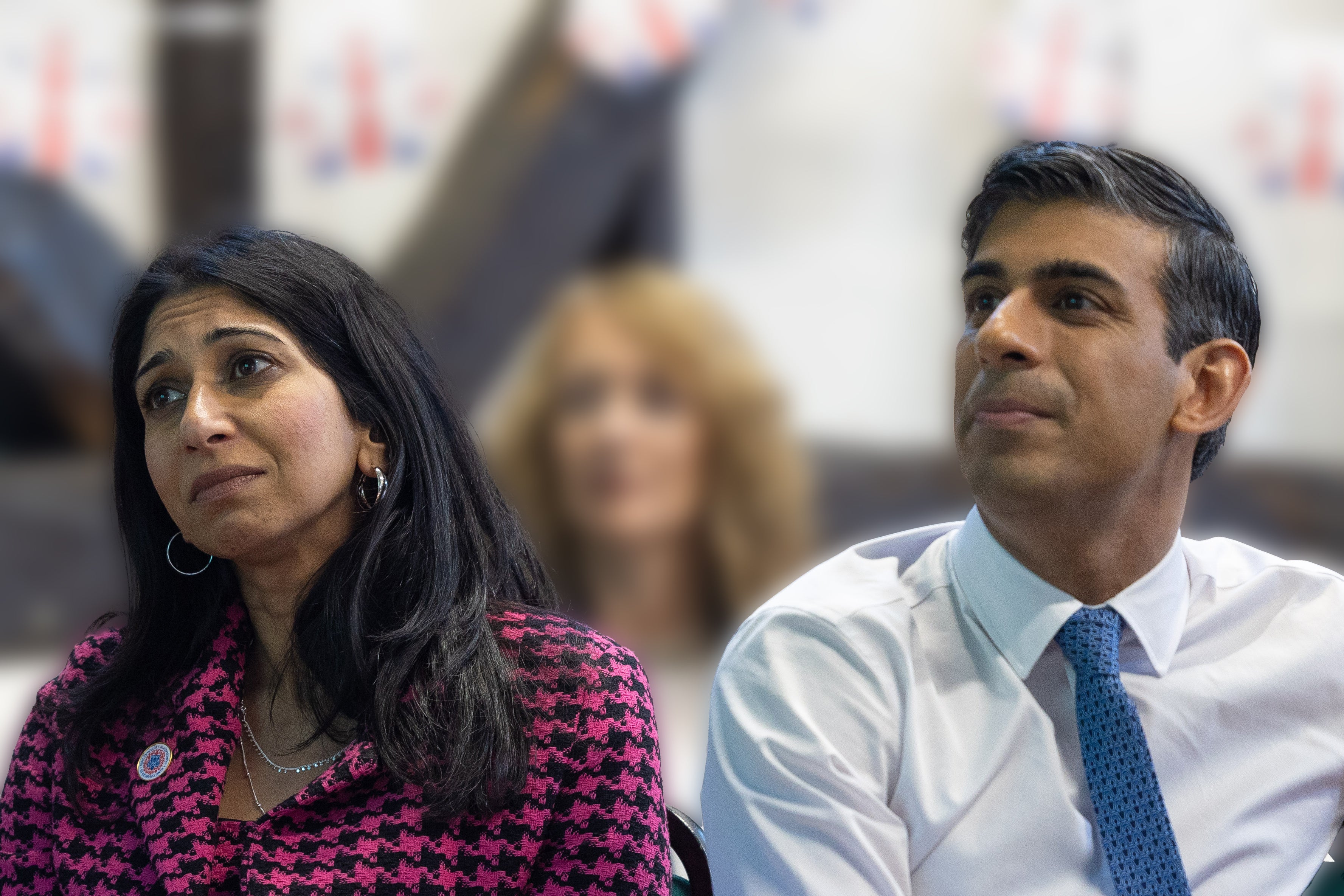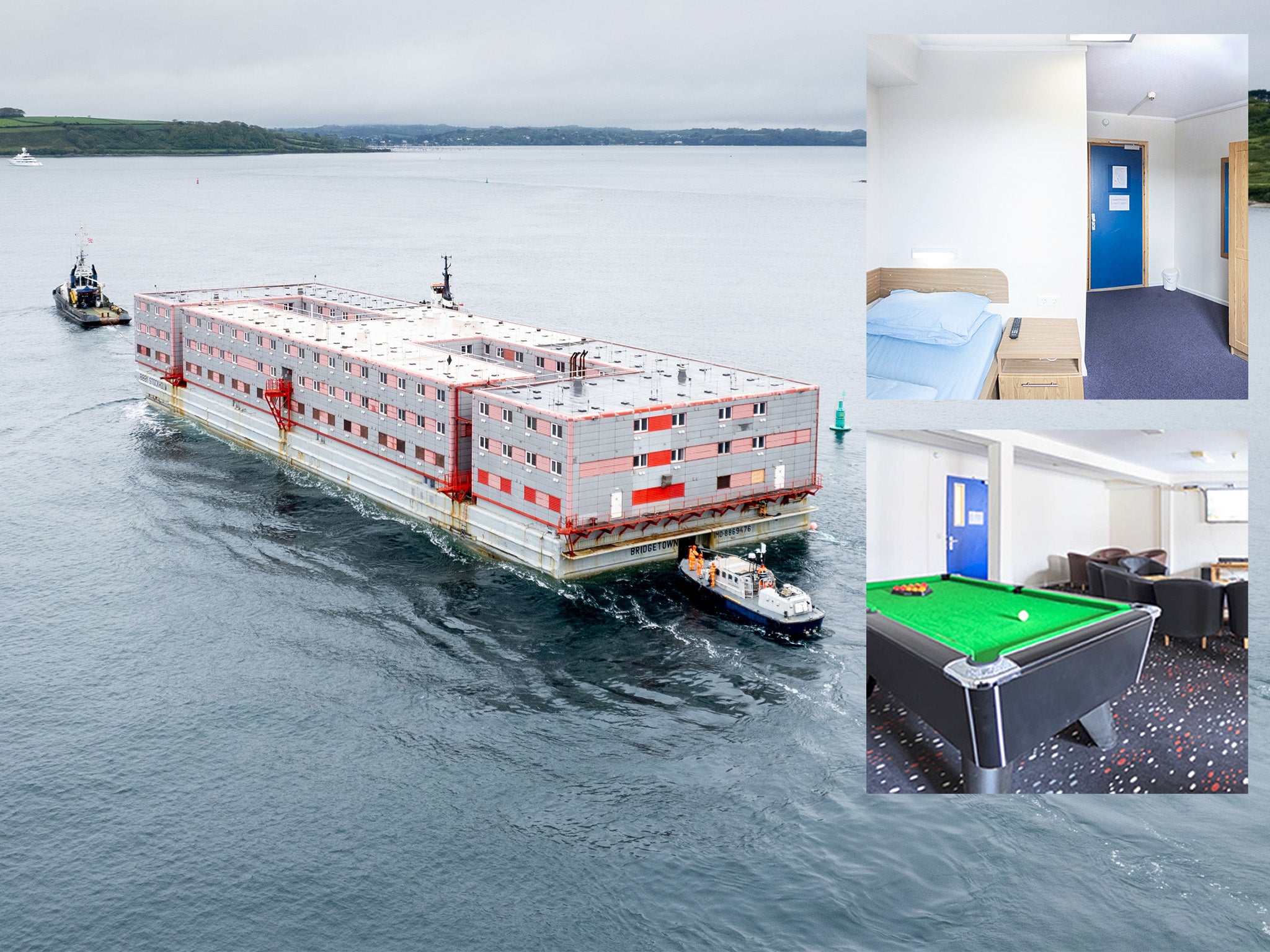Sunak says ‘stop the boats’ plan is ‘starting to work’ as he announces two new barges
PM accused of ‘self-congratulatory’ hubris – but insists his policies are acting as a deterrent rather than poor weather in Channel
Rishi Sunak has insisted that his plan to tackle the problem of small boat crossings in the English Channel is “starting to work”, as he announced that two more barges will be used to house asylum seekers off the coast of Britain.
The prime minister hailed a 20 per cent fall in asylum seekers making the crossing compared to last year, and claimed that a 90 per cent drop in the number of Albanians arriving by small boat was “proof” that migrants can be deterred by the measures introduced as part of his crackdown.
But opposition parties accused him of “self-congratulatory” hubris and “cynical spin”, saying the announcement of yet more micro-measures, including forcing asylum seekers to share rooms, was like “Groundhog Day”.
The latest row over Mr Sunak’s small boats policy came as:
- Border Force sources said staff believe the fall in crossings is largely down to poor weather
- Tory MP Richard Drax lashed out at “quasi-prison” conditions on offshore vessels
- Deputy Tory party chair Lee Anderson said using barges and making asylum seekers share rooms is “not the answer”
Under pressure to fulfil his “stop the boats” pledge, Mr Sunak used a speech in Kent to insist that his returns deal with Albania is having an impact, with 1,800 Albanians having been sent back in the past six months.
While Tory MPs welcomed the latest figures, some remain concerned that those returned to Albania represent only a small proportion of the 12,000 who arrived from the country – which is deemed safe by the government – via the Channel in 2022.
Sir Iain Duncan Smith said that far more Albanians should have been returned to their home country. The former Tory leader told The Independent: “If we have had an [Albania] agreement going back to December, then surely we should have been able to get out more people.”
Former justice secretary Robert Buckland praised Mr Sunak and said the latest figures were “encouraging” – but warned that the dearth of returns deals like the one with Albania means that progress may be a “hard slog”.
Mr Buckland told The Independent: “The lack of wider returns agreements remains a problem. The government would be wise to pursue as many agreements as possible. We have to continue constructive dialogue with the French and other European countries – we shouldn’t give up.”

Analysis of provisional Home Office data suggests that, as of 3 June, 7,610 people had been detected crossing the Channel in 2023, compared with 9,954 by the same date in 2022 – a decrease of just over 20 per cent.
“When we said we would stop the boats, I meant it – and that’s what we’re delivering,” said Mr Sunak, before admitting that the crossings would continue this summer. “We still have a long way to go.”
Mr Sunak said the 90 per cent year-on-year fall in the number of Albanians arriving on small boats was “proof that our deterrence strategy can work”.
However, Home Office research carried out in 2022 found that there was “no evidence” that the government’s crackdown policies influence the behaviour of migrants making the journey to the UK.
Dr Peter William Walsh, senior researcher at the Migration Observatory at the University of Oxford, said it was “too early to say for sure what the trajectory of boat arrivals is ... the main test will be over the summer months, when weather is better and boat crossings tend to peak”.
Dr Walsh also cautioned against the idea that the Sunak plan was having a “deterrent effect”, saying it was “not possible to disentangle the government’s policy changes from the range of other factors that influence irregular arrivals”.
Lucy Moreton, of the Immigration Services Union, which represents Border Force staff, said the numbers from Albania had dropped off by December – pre-dating media coverage of the Illegal Migration Bill.
“There is some evidence that the French are becoming much more effective in deterring crossings,” she said. “There are also an increased number of attempts being aborted and returning to French soil when a vessel has failed. However, crossings are continuing, and planning continues to anticipate a similar number to last year.”
Last year saw around 45,000 arrivals by small boat in total. In April this year, Home Office representatives told the High Court the department was working on estimates of up to another 56,000 arrivals – which would be a new record and a rise of over a fifth on 2022.

The prime minister played down the possibility that bad weather might have caused the recent fall in the number of boats. “Crossings elsewhere in Europe are up by almost a third over a similar time period,” he said, insisting that the lower UK figure is down to “the actions we’ve put in place”.
However, The Independent understands that many Border Force staff believe the reduction in crossings is largely due to poor weather conditions in the Channel.
Mr Sunak revealed that the government had secured two new vessels to house 1,000 people, beyond the 500 migrants set to be placed in the Bibby Stockholm barge off Dorset within a fortnight. But neither No 10 nor the Home Office would say where the new barges will be located.
The Tory leader also announced that two large sites to accommodate asylum seekers at Wethersfield and Scampton would be ready to take in nearly 3,000 people by the autumn.

Sir Keir Starmer attacked Mr Sunak for producing “policies that aren’t working” while giving himself a “self-congratulatory pat on the back”. The Labour leader added: “It feels like Groundhog Day.”
The Liberal Democrats’ home affairs spokesperson Alistair Carmichael accused Mr Sunak of “cynical spin”, pointing out that the asylum backlog remains at a record high and returns remain “exceptionally low”.
Lee Anderson, deputy chair of the Conservative Party, appeared to dismiss the government’s latest policies, saying: “Sharing rooms, and barges ... and relying on the French is not the answer.” He added: “Anyone with any common sense knows what the answer is – and that’s to get the flights off to Rwanda as quick as possible.”
Tory MP Richard Drax said he was angry about the “quasi-prison” barge coming to dock at Portland in Dorset. “I’m against it,” he told LBC. “This barge will be nothing more than a quasi-prison. Who will monitor them? What happens if they disappear?”
Amnesty International UK’s chief executive Sacha Deshmukh condemned the addition of more barges to house asylum seekers, arguing that “corralling large numbers of people onto giant barges is a terrible idea and should be abandoned”.
Mr Sunak also confirmed a new policy of asking hotels to make sure that single male asylum seekers share rooms. It follows protests by some migrants who had been asked to share four to a room in Pimlico, London.
“If you’re coming here illegally, claiming sanctuary from death, torture or persecution, then you should be willing to share a taxpayer-funded hotel room in central London,” the prime minister said.
Challenging home secretary Suella Braverman in the Commons, Labour’s shadow home secretary Yvette Cooper said: “All we get is rhetoric, rhetoric, while the reality gets worse. Demented assumptions, unworkable plans and empty spin.”
Ms Braverman responded: “We have a long way still to go, and we are not complacent. Unlike the benches opposite, we have a plan ... We will not rest until we stop the boats.”
Join our commenting forum
Join thought-provoking conversations, follow other Independent readers and see their replies
Comments



Bookmark popover
Removed from bookmarks